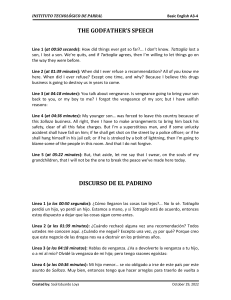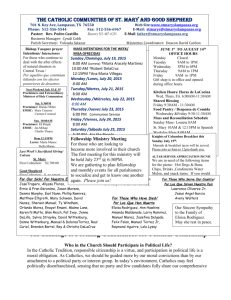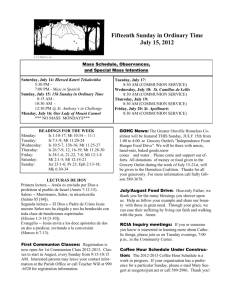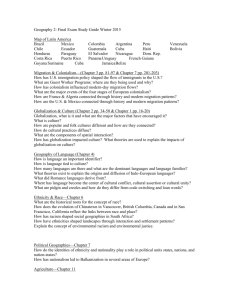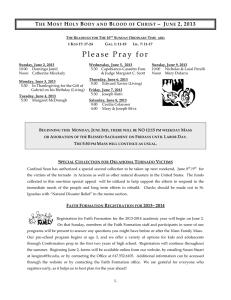Notassobredesterritorializacionynacionalismo
advertisement
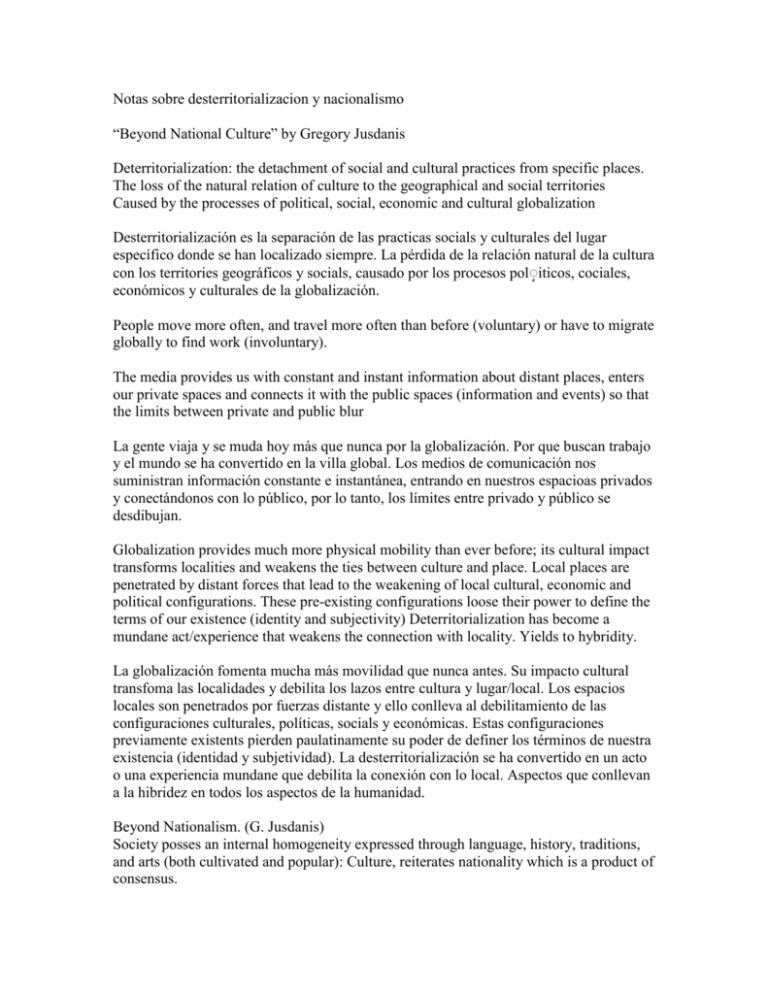
Notas sobre desterritorializacion y nacionalismo “Beyond National Culture” by Gregory Jusdanis Deterritorialization: the detachment of social and cultural practices from specific places. The loss of the natural relation of culture to the geographical and social territories Caused by the processes of political, social, economic and cultural globalization Desterritorialización es la separación de las practicas socials y culturales del lugar específico donde se han localizado siempre. La pérdida de la relación natural de la cultura con los territories geográficos y socials, causado por los procesos polٕ iticos, cociales, económicos y culturales de la globalización. People move more often, and travel more often than before (voluntary) or have to migrate globally to find work (involuntary). The media provides us with constant and instant information about distant places, enters our private spaces and connects it with the public spaces (information and events) so that the limits between private and public blur La gente viaja y se muda hoy más que nunca por la globalización. Por que buscan trabajo y el mundo se ha convertido en la villa global. Los medios de comunicación nos suministran información constante e instantánea, entrando en nuestros espacioas privados y conectándonos con lo público, por lo tanto, los límites entre privado y público se desdibujan. Globalization provides much more physical mobility than ever before; its cultural impact transforms localities and weakens the ties between culture and place. Local places are penetrated by distant forces that lead to the weakening of local cultural, economic and political configurations. These pre-existing configurations loose their power to define the terms of our existence (identity and subjectivity) Deterritorialization has become a mundane act/experience that weakens the connection with locality. Yields to hybridity. La globalización fomenta mucha más movilidad que nunca antes. Su impacto cultural transfoma las localidades y debilita los lazos entre cultura y lugar/local. Los espacios locales son penetrados por fuerzas distante y ello conlleva al debilitamiento de las configuraciones culturales, políticas, socials y económicas. Estas configuraciones previamente existents pierden paulatinamente su poder de definer los términos de nuestra existencia (identidad y subjetividad). La desterritorialización se ha convertido en un acto o una experiencia mundane que debilita la conexión con lo local. Aspectos que conllevan a la hibridez en todos los aspectos de la humanidad. Beyond Nationalism. (G. Jusdanis) Society posses an internal homogeneity expressed through language, history, traditions, and arts (both cultivated and popular): Culture, reiterates nationality which is a product of consensus. Is national culture over? Is the mortar (mortero) of sentiments, beliefs, customs that once cemented nations now crumbling before our eyes? What is the role of culture today? The demise of culture signals a conclusion of modernity. Today, can we say that culture can mean anything (ethnicity is the primordial identity of each group, is the most problematic term, referring to premodern communities, modern nations, and postmodern multicultural entities. Ethnicity enters the political sphere of nationalism at times when cultural homogeneity is required by the economic base of social life). Culture plays a key role in the configuration of nation in modern societies but with the break up of nation states, culture must be redefined to maneuver through the pressures of globalization. National culture is modern insofar as it connects ethnicity to territory and installs its ethnicity as the source of state power. The authority of the nation state derived from its individual culture, which is an ethnic identity that has been nationalized: A nation is a self aware ethnic group. National unity/culture was conceived first by the elites before the establishment of the state. Nation comes before state. Nationalism is a cultural enterprise that has one foot in the past traditions and one towards modernization. Today: We are all interconnected as never before, as members of diasporas, professions, and in all aspects of our lives (what we wear, eat, hear, without even sharing a territory). Capital has become spatially indifferent by reducing its dependency on particular raw materials, markets, sources of energy, and areas of the city. Globalization is a threat to many societies, because nationalism posited the welfare of ethnicity in cultural terms but globalization capsizes (vuelca) nations in an immensity of sameness (ethnization of national culture by means of homogenization). Globalization blurs national boundaries, deterritorializes culture and terminates its autonomy. National culture is replaced by global culture because the center/periphery model does not longer apply. Postmodern ethnicities: In First World countries we see the critique of national culture but also the accentuation of ethnic identities. Ethnic identity becomes self conscious under the pressure of homogenization or acculturation. This phenomenon is not post modern but a product of modern societies because “Emphasis on self-invention departs from past practices, when identity was more prescriptive and primarily attachment was stipulated by one’s clan, religion, or race…. The formation of identity is transformed into a reflexive project by which people make artworks of themselves… individuals (re)invent their past by selectively using knowledge about their heritage… ethnic boundaries have given people considerable freedom in manipulating suitable cultural symbols for a personal pastiche. This is why individuals of modern suburbia have so many options in forming their identity, even though they see it as authentic and not as a matter of choice” (54). Does this means de-centered subjectivities: a free invention of identity in postmodern societies.
